Mitigation Strategies for Challenges in the Philippine Recycling Industry (2023)
Mitigation Strategies for Challenges in the Philippine Recycling Industry (2023)
Meeting Quality Requirements:
Update: As of 2023, the lack of high-capacity and advanced technologies remains a challenge for Philippine recyclers. However, there have been incremental advancements in recycling technologies globally.
Mitigation Procedure: The Philippine Government can collaborate with international organizations to facilitate technology transfer programs. This could involve providing subsidies or incentives for recyclers to adopt advanced technologies for producing high-grade recycled resins. Implementing stricter regulations on waste segregation and incentivizing source-separated collection could also contribute to cleaner feedstock.
Specific Sample: The adoption of advanced sorting and cleaning technologies by a local recycler, supported by government incentives, resulted in a significant improvement in the quality of recycled resins. This showcases the effectiveness of technology adoption with the right policy support.
Meeting Quantity Requirements:
Update: The reliance on feedstock from the informal sector remains a challenge, impacting the continuity and quality of the supply chain. Efforts to establish strong relationships with city governments have made some progress, but challenges persist.
Mitigation Procedure: The Philippine Government can invest in infrastructure for formal waste collection and establish partnerships with the private sector for consistent feedstock supply. Implementing stricter regulations and monitoring mechanisms for informal recyclers can encourage a more formalized and regulated supply chain.
Specific Sample: A pilot project in collaboration with a city government resulted in the establishment of a formalized collection system, ensuring a steady supply of high-quality feedstock for a local recycler.
Meeting Supplier Standard Requirements:
Update: The challenges in meeting supplier standards set by multinational companies persist, particularly regarding payment terms and compliance with environmental, health, and safety standards.
Mitigation Procedure: The government can facilitate financial support programs or low-interest loans to assist recyclers in improving liquidity. Additionally, offering capacity-building programs to enhance compliance with international standards can be beneficial.
Specific Sample: A government-backed financial assistance program enabled a recycler to upgrade its facilities, meeting international standards and improving its ability to adhere to stringent supplier requirements.
Unfair Competition from the Informal Recycling Industry:
Update: Unfair competition from the informal sector continues to undermine the formal recycling industry, impacting pricing dynamics and revenues.
Mitigation Procedure: Strengthening law enforcement and implementing stricter penalties for informal recyclers can create a level playing field. Additionally, public awareness campaigns emphasizing the importance of supporting formal recycling businesses can contribute to changing consumer behavior.
Specific Sample: Increased law enforcement efforts in a specific region led to a reduction in illegal recycling activities, allowing formal recyclers to compete more fairly.
High Electricity Costs:
Update: High electricity costs persist, affecting the overall profitability of recycling operations.
Mitigation Procedure: The government can explore renewable energy initiatives, provide tax incentives for the adoption of energy-efficient technologies, and negotiate with energy providers for special tariffs for the recycling industry.
Specific Sample: A recycling facility in partnership with a renewable energy company successfully reduced electricity costs by transitioning to solar energy, showcasing the potential for sustainable solutions.
High Transportation Costs:
Update: The archipelagic nature of the Philippines and logistical challenges contribute to high transportation costs.
Mitigation Procedure: Investment in transportation infrastructure, streamlining regulations, and exploring innovative logistics solutions can help reduce costs. Government support for industry-specific logistics initiatives can also be beneficial.
Specific Sample: A collaborative effort between the government and private sector stakeholders led to the development of a more efficient logistics system, resulting in reduced transportation costs for recyclers.
Here are some additional points to consider:
- Focus on Circular Economy: Emphasize the transition from a linear "take-make-waste" model to a circular economy approach that prioritizes resource recovery, product design for recycling, and waste minimization.
- Data-Driven Solutions: Encourage the use of data to track waste streams, inform policy decisions, and identify areas for improvement in collection, sorting, and processing.
- Innovation and Technology: Highlight the potential of innovative technologies like artificial intelligence, robotics, and automation to improve efficiency, reduce costs, and enhance sorting accuracy.
- Building Capacity: Focus on building the capacity of local stakeholders, including government officials, waste collectors, recyclers, and consumers, through training programs, awareness campaigns, and knowledge sharing initiatives.
- Financing Mechanisms: Explore diverse financing mechanisms such as public-private partnerships, environmental bonds, and carbon credits to attract investment and support the development of advanced recycling infrastructure.
- Addressing Social Issues: Acknowledge the social issues associated with the informal recycling sector and develop strategies for integrating informal workers into the formal system, ensuring fair wages and safe working conditions.
Additionally, consider highlighting:
- The role of Extended Producer Responsibility (EPR) policies in encouraging manufacturers to take responsibility for the end-of-life management of their products.
- The importance of consumer education and awareness campaigns to promote responsible waste disposal and support for the formal recycling sector.
- The potential of digital platforms and mobile applications to connect consumers with responsible waste management services and facilitate participation in circular economy initiatives.
In conclusion, addressing these challenges requires a comprehensive and collaborative approach involving the government, industry stakeholders, and the community. Continuous monitoring, adaptation of policies, and targeted interventions based on specific challenges will contribute to a more sustainable and profitable recycling industry in the Philippines.
References:
© 2021 The World Bank Group. (n.d.). Market Study for the Philippines: PLASTICS CIRCULARITY OPPORTUNITIES AND BARRIERS. https://openknowledge.worldbank.org. Retrieved January 22, 2023, from https://openknowledge.worldbank.org/entities/publication/61e2e030-9dc2-5013-a8ff-7565919e17ee/full
World Bank Group 2021. Market Study for the Philippines: Plastics Circularity Opportunities and Barriers. Marine Plastics Series, East Asia and Pacific Region. Washington DC.


Comments
Post a Comment